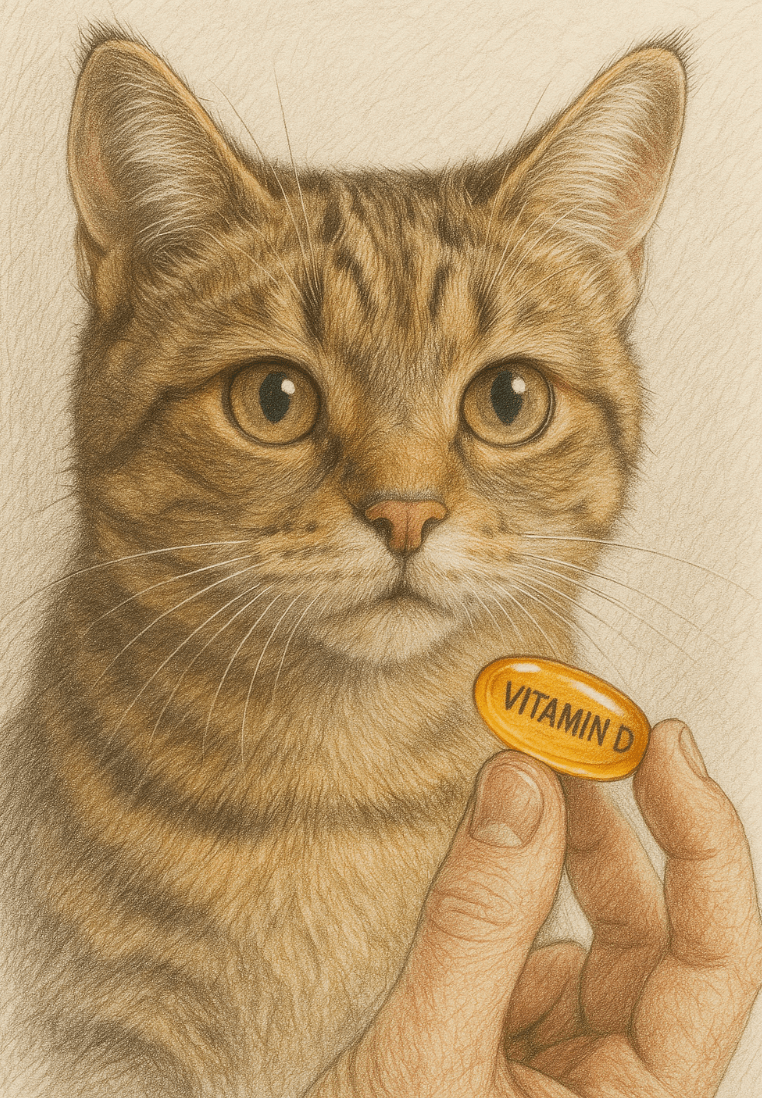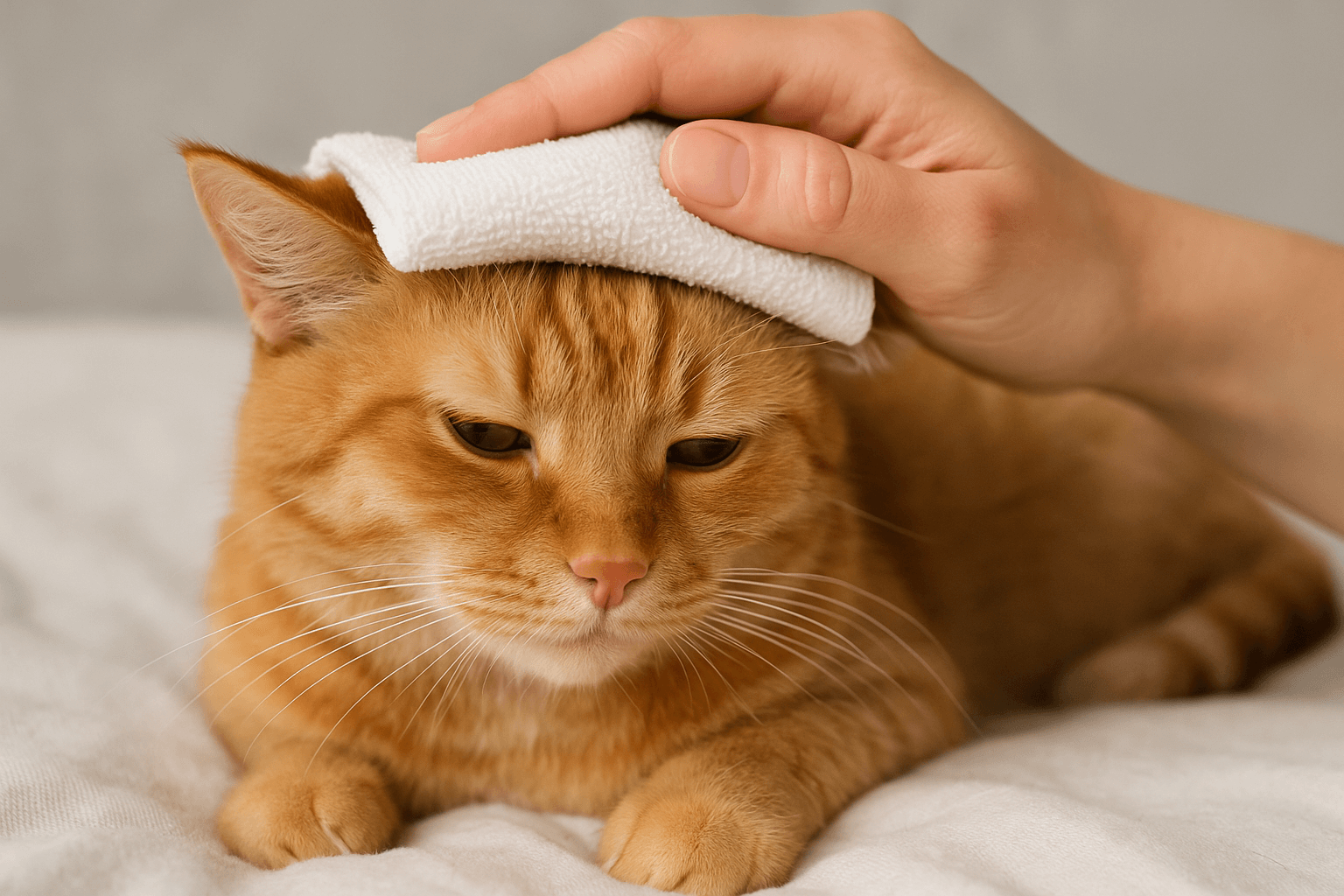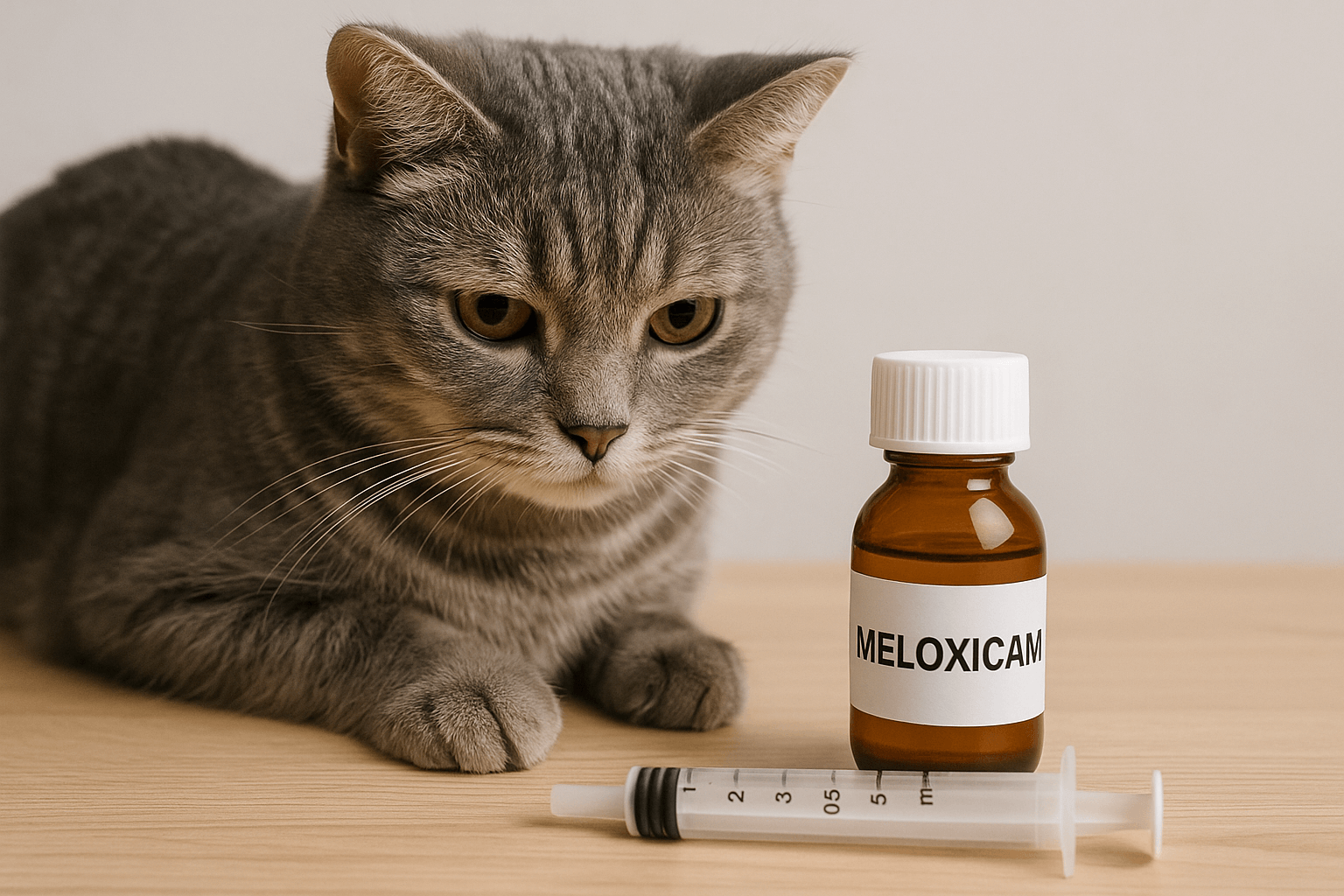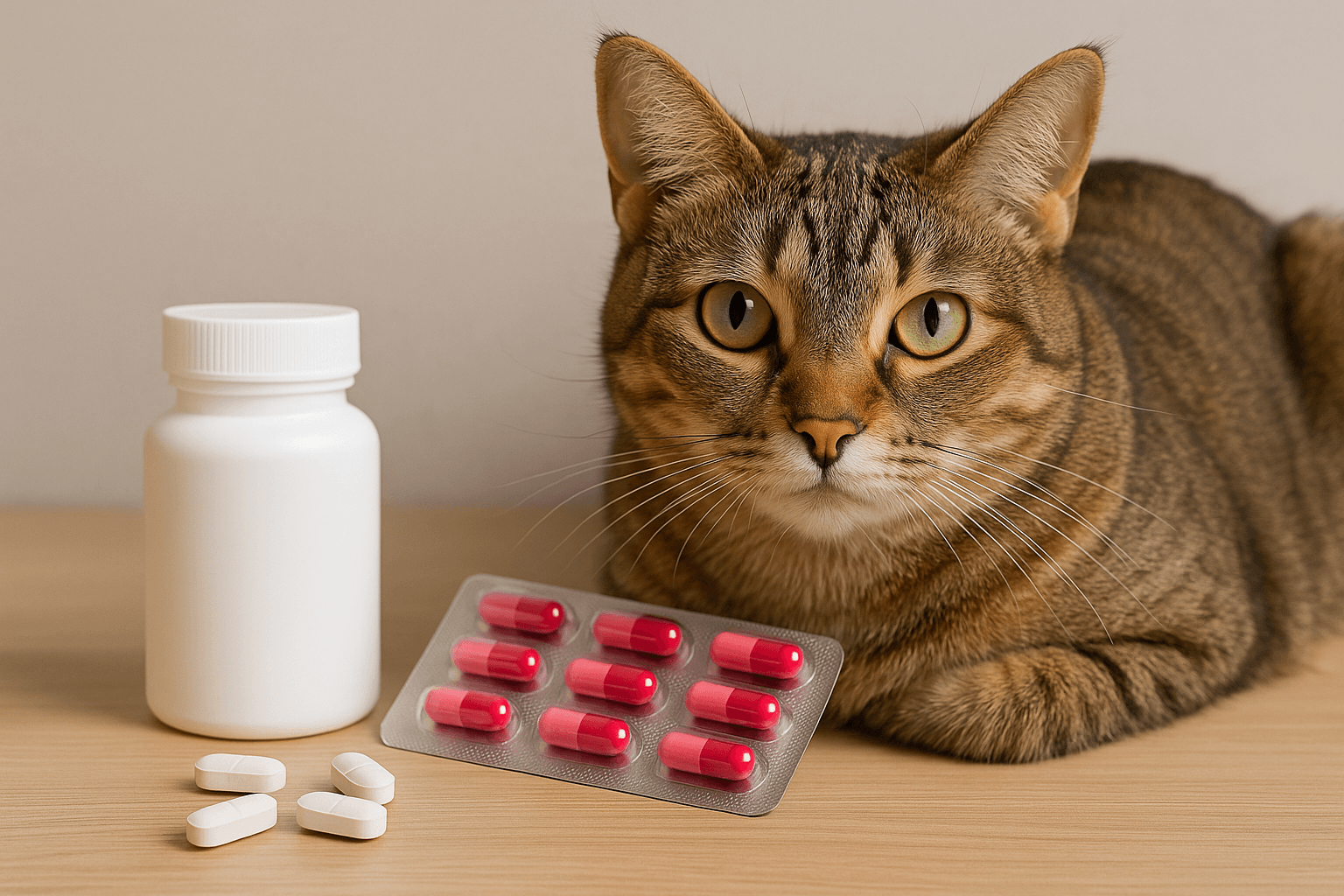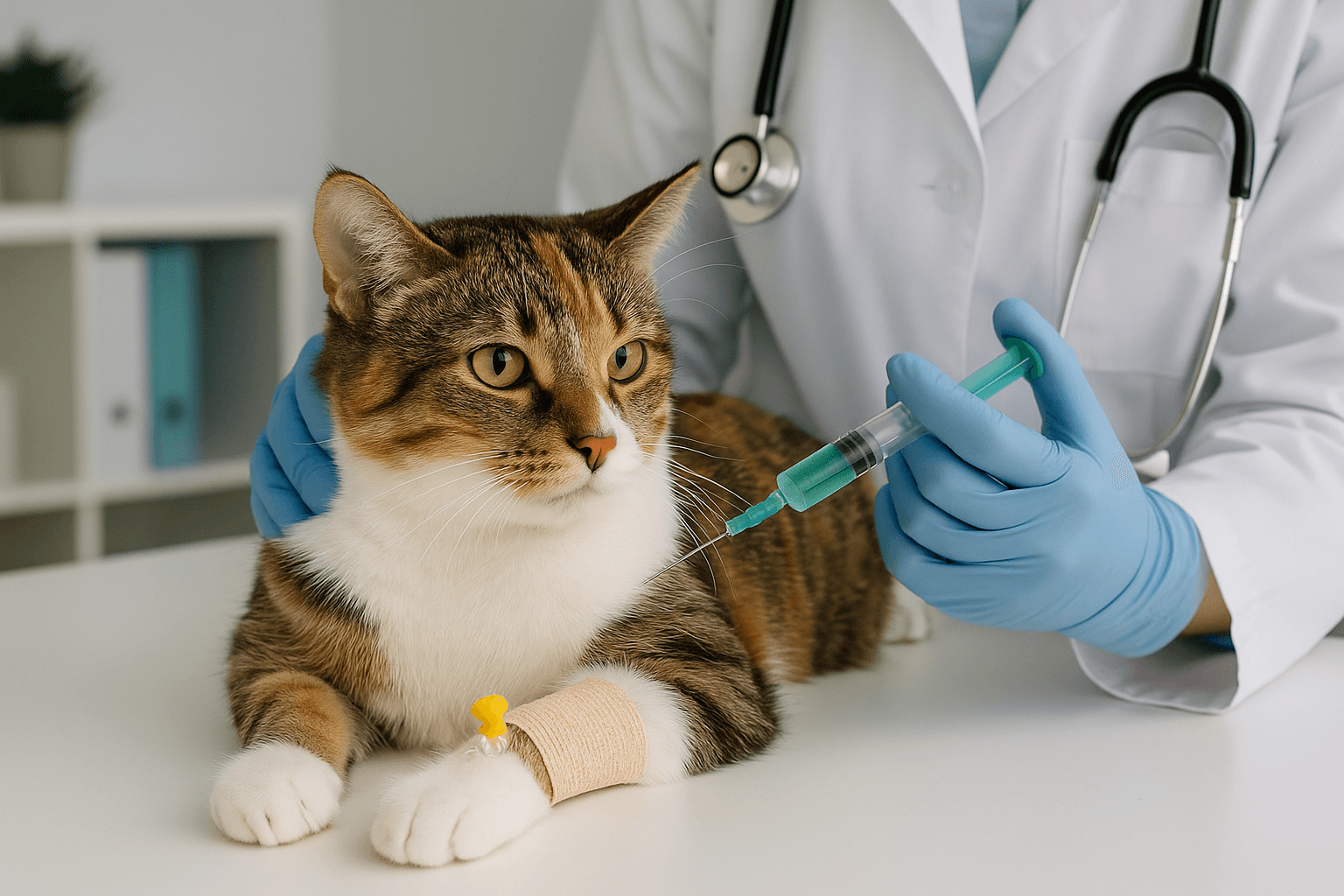Can Cats Eat Vitamin D?
Vitamin D is an essential nutrient for humans and many animals, playing a critical role in bone health, immune function, and overall well-being. But what about cats? Can cats eat vitamin D, or could it pose risks to their health? As obligate carnivores, cats have unique dietary needs, and while they do require some vitamin D, excessive amounts can be toxic. Understanding the balance between necessity and potential harm is crucial for ensuring your feline friend’s health. In this blog post, we’ll explore everything you need to know about vitamin D for cats, including its benefits, risks, and safe sources.
The Role of Vitamin D in a Cat’s Diet
Vitamin D plays a vital role in maintaining a cat’s overall health, particularly when it comes to bone development and calcium absorption. However, cats cannot synthesize vitamin D from sunlight like humans do, so they must obtain it through their diet. Here’s how vitamin D supports your cat’s well-being:
Bone Health:
Vitamin D helps regulate calcium and phosphorus levels, which are essential for strong bones and teeth.Immune System Support:
Adequate vitamin D levels contribute to a healthy immune system, helping cats fight off infections and illnesses.Muscle Function:
Proper vitamin D intake ensures optimal muscle function, reducing the risk of weakness or fatigue.Nerve Signaling:
Vitamin D supports nerve communication, which is crucial for coordination and reflexes.Prevention of Deficiency Diseases:
A lack of vitamin D can lead to conditions like rickets or osteomalacia, which weaken bones and cause discomfort.
While vitamin D is essential, it’s important to ensure your cat receives the right amount to avoid toxicity or deficiency.
Risks of Excessive Vitamin D in Cats
While vitamin D is necessary, too much of it can be harmful to cats. Vitamin D toxicity, also known as hypervitaminosis D, can occur if a cat ingests excessive amounts through supplements, certain foods, or accidental exposure. Here are the potential risks:
Calcium Imbalance:
Excess vitamin D increases calcium levels in the blood, leading to calcification of soft tissues like the kidneys and heart.Kidney Damage:
High levels of vitamin D can cause kidney failure, a life-threatening condition requiring immediate veterinary care.Loss of Appetite:
Cats with vitamin D toxicity often refuse to eat, leading to weight loss and malnutrition.Vomiting and Diarrhea:
Gastrointestinal distress is a common symptom of vitamin D poisoning in cats.Lethargy and Weakness:
Overexposure to vitamin D can leave cats feeling weak, sluggish, and uninterested in activity.
These risks highlight the importance of monitoring your cat’s vitamin D intake and avoiding unnecessary supplementation.
Check this guide 👉Can Cats Eat Avocado Skin? Best 7 Expert Tips!
Check this guide 👉Can Cats Eat Gerbera Daisies? Best 7 Expert Tips!
Check this guide 👉Can Cats Eat Chrysanthemums? Best 7 Expert Tips!
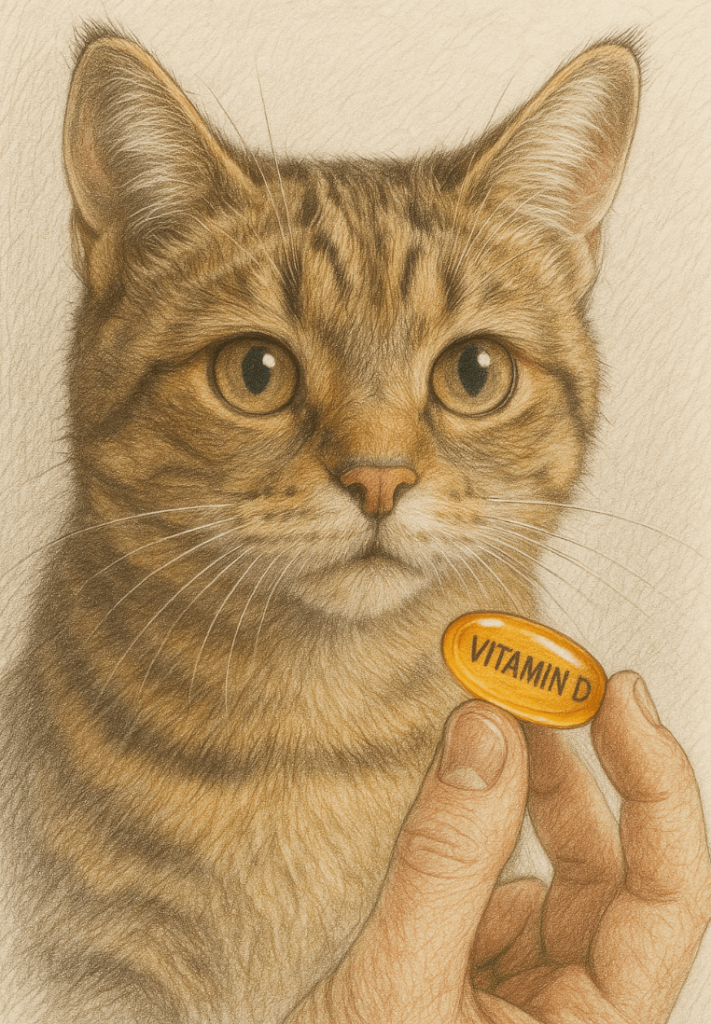
Safe Sources of Vitamin D for Cats | Foods to Avoid Due to High Vitamin D |
|---|---|
Commercial cat food (formulated with balanced nutrients) | Fish oil supplements (unless vet-recommended) |
Organ meats like liver (in moderation) | Fortified dairy products |
Prey animals (if fed a raw diet under supervision) | Certain fish like salmon or tuna (in excess) |
Sunlight exposure (indirectly through diet) | Human multivitamins containing vitamin D |
Vet-prescribed supplements | Processed pet treats with added vitamins |
Signs Your Cat May Be Suffering from Vitamin D Toxicity
If you suspect your cat has consumed too much vitamin D, it’s important to recognize the warning signs early. These symptoms can help you identify potential toxicity and seek veterinary assistance promptly.
Increased Thirst and Urination:
Cats with vitamin D toxicity often drink more water and urinate excessively due to kidney stress.Weight Loss:
A sudden drop in weight may indicate that your cat is suffering from nutrient imbalances.Abdominal Pain:
Discomfort or sensitivity around the abdomen can signal internal damage caused by vitamin D toxicity.Behavioral Changes:
Lethargy, irritability, or hiding behaviors may suggest your cat is feeling unwell.Swollen Joints:
Excess calcium deposits can cause joint swelling and stiffness, affecting mobility.
Recognizing these signs allows you to act quickly and prevent further complications.
How to Safely Provide Vitamin D to Your Cat
Ensuring your cat gets the right amount of vitamin D requires careful attention to their diet and lifestyle. Follow these guidelines to keep their vitamin D intake safe and balanced.
Stick to Balanced Cat Food:
High-quality commercial cat food is formulated to provide all the nutrients your cat needs, including vitamin D.Avoid Over-Supplementation:
Never give your cat human vitamins or supplements without consulting your veterinarian first.Monitor Treat Intake:
Limit treats that contain added vitamins, as they can contribute to excessive intake over time.Consult Your Vet Regularly:
Routine check-ups help ensure your cat’s diet meets their nutritional needs and doesn’t exceed safe limits.Supervise Raw Diets Closely:
If feeding a raw diet, work with a vet or nutritionist to ensure proper nutrient balance, including vitamin D.
By following these steps, you can provide your cat with the vitamin D they need without risking toxicity.
Common Sources of Accidental Vitamin D Exposure in Cats
Cats can accidentally ingest excessive vitamin D through various means, often without their owners realizing it. Being aware of these sources can help you prevent accidental toxicity.
Human Supplements Within Reach:
Curious cats may chew on or ingest vitamin D pills left out in the open.Pet Foods Not Formulated for Cats:
Feeding dog food or other inappropriate diets can expose cats to unsafe levels of nutrients.Rodenticides Containing Vitamin D:
Some rat poisons use vitamin D as an active ingredient, making them highly toxic if ingested by pets.Raw Diets Without Professional Guidance:
Improperly balanced raw diets may include organ meats or fish high in vitamin D.Fortified Human Foods:
Sharing fortified cereals, milk, or other human foods can inadvertently harm your cat.
Awareness of these risks helps you take preventive measures to protect your cat.
Benefits of Preventive Veterinary Care for Nutritional Balance
Regular veterinary visits play a crucial role in maintaining your cat’s nutritional health, including their vitamin D levels. Here’s how preventive care can benefit your feline companion.
Blood Tests for Nutrient Levels:
Routine bloodwork can detect deficiencies or excesses in vitamins like D before symptoms arise.Personalized Diet Plans:
Vets can recommend tailored diets based on your cat’s age, weight, and health conditions.Early Detection of Toxicity:
Catching vitamin D toxicity early improves treatment outcomes and reduces long-term damage.Guidance on Supplements:
Your vet can advise on safe supplements if needed, ensuring proper dosing and usage.Education on Safe Foods:
Vets can educate you on which foods are safe and which to avoid for optimal feline nutrition.
Preventive care ensures your cat stays healthy and avoids nutritional pitfalls.
Alternative Ways to Support Your Cat’s Bone Health
While vitamin D is crucial for bone health, there are other ways to support your cat’s skeletal system beyond supplementation. These alternatives promote overall wellness naturally.
High-Quality Protein Sources:
Lean meats like chicken or turkey provide essential amino acids for muscle and bone maintenance.Calcium-Rich Foods:
Small amounts of cooked eggs or ground eggshells can boost calcium intake safely.Omega-3 Fatty Acids:
Fish oils (in moderation) support joint health and reduce inflammation.Weight Management:
Keeping your cat at a healthy weight reduces stress on bones and joints.Regular Exercise:
Playtime and physical activity strengthen muscles and improve mobility.
These strategies complement vitamin D intake and contribute to lifelong bone health for your cat.
Frequently Asked Questions About Cats and Vitamin D
Can I give my cat human vitamin D supplements?
No, human supplements are not safe for cats and can lead to toxicity. Always consult your vet before giving any supplement.
What happens if my cat eats food high in vitamin D?
Occasional exposure is unlikely to harm, but consistent overconsumption can lead to toxicity. Monitor for symptoms and contact your vet if concerned.
Do cats need sunlight to produce vitamin D?
Unlike humans, cats cannot synthesize vitamin D from sunlight and must obtain it through their diet.
How much vitamin D is safe for cats?
The exact amount varies based on age, size, and health status. Your vet can provide personalized recommendations.
What should I do if my cat shows signs of vitamin D toxicity?
Seek immediate veterinary care to address the issue and prevent long-term damage.
Balancing Vitamin D for Your Cat’s Health
Vitamin D is an essential nutrient for cats, but finding the right balance is key to ensuring their well-being. While deficiencies can lead to serious health issues, overexposure poses equally significant risks. By understanding your cat’s dietary needs, avoiding unnecessary supplementation, and consulting your veterinarian regularly, you can provide a safe and nutritious diet that keeps your feline friend happy and healthy. Remember, when it comes to vitamin D, moderation and professional guidance are your best tools for success.
Cat Fever Treatment: Best 7 Expert Tips! Discover expert advice on identifying, managing, and treating fever in cats to ensure their quick recovery and well-being.
Understanding Meloxicam for Cats: Best 7 Expert Tips! Learn how to safely administer meloxicam, manage side effects, and ensure your cat's comfort with expert advice on feline pain relief.
Amoxicillin for Cat UTI: Best 7 Expert Tips! Discover safe usage, dosage guidelines, and expert advice on treating feline urinary tract infections effectively with amoxicillin.
Understanding Cat Cancer Treatment: Best 7 Expert Tips! Discover expert advice on managing feline cancer, from early detection to treatment options, ensuring your cat’s health and comfort.

